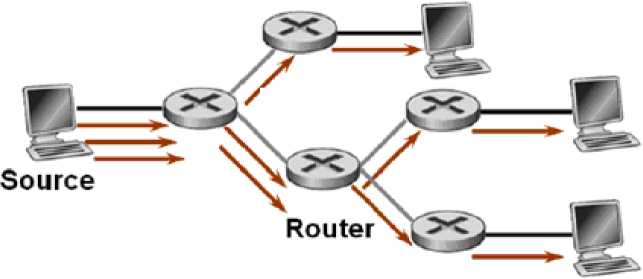destinations. Figure 2.2 shows the unicast operation where the source needs to send three
copies of the same packet to be received by the three destinations.

Figure 2.2 Unicast-based multicast packet delivery
The source node knows, before sending the packets (data or control), the final destination
node address which should receive these packets. These protocols can be classified into:
proactive, reactive and hybrid routing protocols, which they differ in the way that the
intermediate nodes -located between the source and the destination- obtain the routing
information.
2.4.2 Proactive routing protocol
In proactive routing protocols, each node maintains routing information about all other nodes
(or nodes in an exact division) in the network. This information is kept in tables, which is
updated periodically. Different routing protocols have different tables according to the way
each of these protocols works. The advantage of proactive routing protocols is that the source
needs the route to be ready; the routes are ready and stored so that there will not be any
latency. The problem with this kind of protocols, however, is that some of the stored routes
may never be used. Another problem comes when the network topology is changing very fast
leading to consuming a scarce wireless network bandwidth to keep the route information up
to date. Examples of this kind of ad hoc routing protocols : Destination Sequenced Distance
13
More intriguing information
1. The name is absent2. The name is absent
3. The name is absent
4. Using Surveys Effectively: What are Impact Surveys?
5. Moi individuel et moi cosmique Dans la pensee de Romain Rolland
6. Staying on the Dole
7. Evolving robust and specialized car racing skills
8. The storage and use of newborn babies’ blood spot cards: a public consultation
9. Labour Market Flexibility and Regional Unemployment Rate Dynamics: Spain (1980-1995)
10. The Impact of Financial Openness on Economic Integration: Evidence from the Europe and the Cis